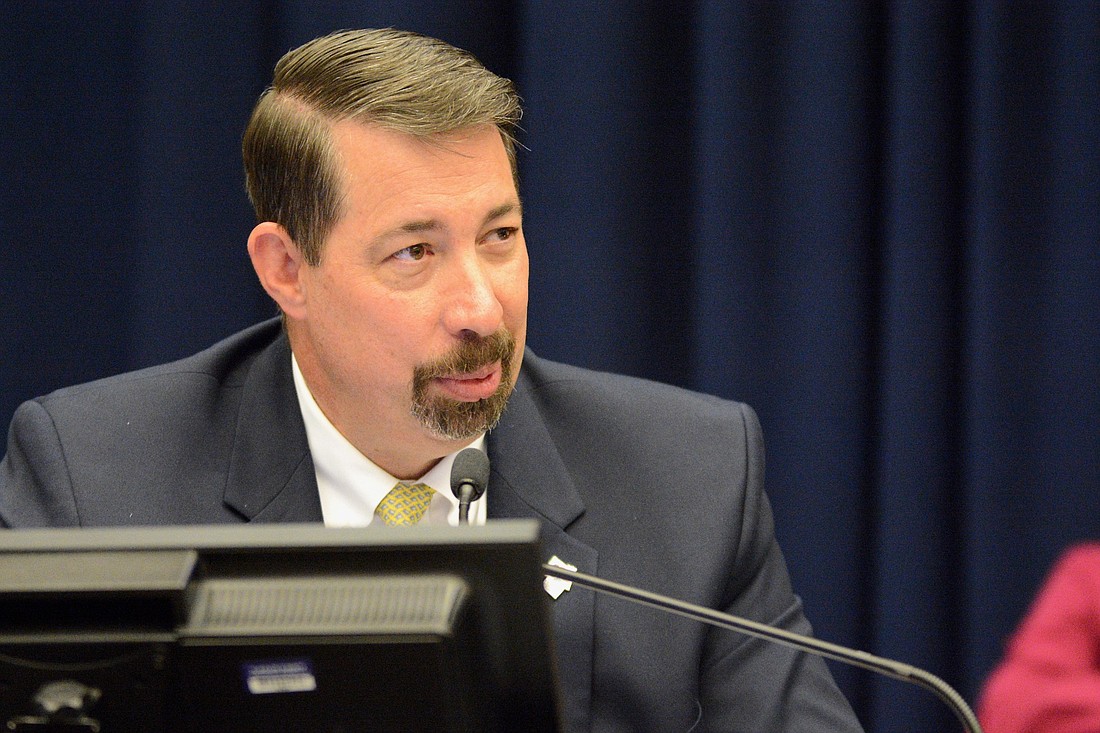- March 13, 2025

Think of the spots on a beach where people sunbathe. Where they stand to fish. Where they play frisbee. What do those places have in common? They mostly happen landward of the mean high-water line, County Administrator Craig Coffey said.
"Everything that people enjoy and love about the beach … is really, for the most part, above the mean high-water mark," he said.
But all of those beachgoers might be forced onto the wetter sand seaward of the mean high-water line if the county doesn't take quick action before July 1 to counteract state legislation that privileges the rights of beachfront property owners over the rights of the public to access the beach, according to county officials. (See Rep. Paul Renner's explanation of the legislation here.)
"The legislation changes the world July 1, 2018. Totally changes the world," County Attorney Al Hadeed told county commissioners during a commission workshop April 16.
The law, which goes into effect July 1, lets beachfront property owners effectively wall off portions of the beach from the public by using signs and barriers to bar regular beachgoers from tromping on or laying out their beach towels on the dry sand above the mean high water line. So beachgoers would be able to walk along the water, but trying to sit down for sunbathing or a picnic might mean getting a wet backside and salt spray-soaked food.
The county can enact an ordinance before July 1 asserting that the "customary use" of the space by members of the public will be protected. But if it doesn't do that, its only remedy would be to take a legal action that would require sending notification to every beachfront property owner and undertaking a legal process to prove the public's "customary use" of the beach.
"This is unprecedented in the United States as far as we know," Hadeed said. "Because what it requires, if you want to establish your customary use, you have to undertake a massive case against all of your beachfront property owners." And what county wants to sue its own residents?
The law had its origins with a dispute in Walton County, in the Panhandle, where beachfront property owners were marking off parts of the wide beach as their own. The county government told them they could not do so. Beachfront property owners sued, and lost.
The legislature then passed House Bill 631, giving owners the right to rope off beach areas or plant signs directing the public away from the dry sand areas.
"They’ve taken a local issue and they’ve exported chaos statewide," Coffey said. "Instead of four lawsuits, there’s going to be hundreds of lawsuits across the state."
The county administration, he said, is working on an ordinance to bring to the commission in May so that it can be approved before the July 1 deadline.
Hadeed noted that the proposed county ordinance protecting public access to the beach would have an additional effect: It would protect the public investment in the county's massive dune restoration project.
The county has poured millions of dollars into creating a dune — work that is, by its nature, at least in part above the high-water line, and that the county undertook with the understanding that the beach would remain accessible to the public. (With or without the ordinance, the public is and would remain barred from walking on the dune itself, for environmental reasons.)
If homeowners were to rope off parts of the beach that the county has spent public dollars on, Hadeed told the commission, "It places us in a very unusual situation. I want you to think back on the tremendous amount of work and research that we did, legally, in order for us to engage in the beach restoration work. … What did we say in every one of those documents? … We articulated the public benefit in the project. It was most important: If we don’t have a public benefit, a major public benefit in a project, we don’t spend money on it."
If that were to change and the beach above the mean high-water line were to be privatized, he said, "Are people going to want to support … the expenditure of public dollars to give somebody a private beach? I just don’t see it."When the county sought federal funding to repair its beaches after Hurricane Matthew, Hadeed said, it had trouble because it did not have a customary use ordinance on its books establishing that the public had a right of access.
"Our access to federal funds was very much restricted because we did not codify our practice," he said.
If the county passes the proposed ordinance, that will no longer be a problem, Hadeed said.
To establish a history of public use of the beach above the mean high-water line, the county's historical curator, Sisco Deen, has been collecting old newspaper clippings and photos showing the public using the beach. The county will also be seeking testimonials from the public about locals' use of the beaches and plans to set up a dedicated email account to take comments from the public on the issue.
The testimonials and media clips will be used during the May hearings on the proposed ordinance to prove the history of the public's customary use of the beaches.